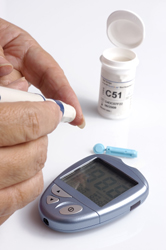Genetic marker for diabetic nephropathy
Diabetes affects five to ten percent of the population in Europe to varying degrees. Out of these patients, around 30-40% will go on to develop diabetic nephropathy (DN) with the need for dialysis and transplant a distinct possibility. As one of the leading complications of this disorder in glucose metabolism, partners of the EU funded project EURAGEDIC aimed to investigate the molecular basis behind DN. The large numbers of the population affected mean that the resources of the EC can be mustered to study the necessarily large sample size required for this complex trait. Out of three European populations, the French National Institute for Health and Medical Research, Inserm, undertook a large case/control study comprising 1,176 patients with diabetes type 1 and 1,323 control subjects for comparison. The team identified polymorphisms and then tested more than 400 haplotype-tagging single nucleotide polymorphisms (SNPs) for association with DN. Finally, only one SNP, located in the UNC13B gene, showed significant linkage with DN after applying the multiple testing correction. The location of the potential marker in gene UNC13B would appear to be linked to the gene's function. UNC13B modulates apoptosis in glomerular cells and is upregulated by hyperglycaemia. This further contributes to the renal complications of diabetic hyperglycaemia and starts to occur early on in the development of DN. The team suggested that the polymorphism could be used as a marker for the initiation of nephropathy, but further research is needed on the exact role of the gene in DN. The discovery of a marker for onset of this diabetic complication would confer huge benefits to patient and healthcare facilities generally. Early diagnosis and intervention would improve risk assessment regarding development of diabetic complications.







